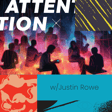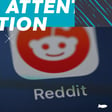Become a Creator today!Start creating today - Share your story with the world!
Start for free
00:00:00
00:00:01

Step-by-Step Process for Distributing Your Content Into an Existing Community w/Micah Zayner
In this episode, Dan Sanchez talks to Micah Zayner, a Senior Marketing Manager at Courier.
They cover:
- How to find the right communities.
- Micah's early mistakes in integrating into those communities.
- The key results he's seen by getting his content accepted.
They cover:
- How to find the right communities.
- Micah's early mistakes in integrating into those communities.
- The key results he's seen by getting his content accepted.
Transcript
Interview with Micah Zainer
00:00:04
Speaker
Welcome back to the Attention Podcast, where you learn how to gain and retain the attention of your buyers to grow an audience. I'm Dan Sanchez with Sweetfish, and today I talked with Micah Zainer, who is the Senior Growth Marketing Manager at Career, about his step-by-step process for distributing your content into an existing community.
Finding and Integrating into Communities
00:00:22
Speaker
We discussed how to find the right communities, Micah's early mistakes in integrating into those communities, and the key results he's seen by getting his content accepted there.
00:00:32
Speaker
As always, I saved my own takeaways from the interview for the end, so make sure to stick around for that. Alright? Alright. Let's get into it.
00:00:43
Speaker
Michael, welcome to the show. Hi, how are you doing? I'm doing well. I'm so glad you're here. And to kick off this interview, I really want to make sure we're on the same line here. Like, recently I've noticed that people define audience differently. So before we kick off this interview, I wanted to ask, how do you define a company's audience?
00:01:02
Speaker
It definitely depends on what industry you're in, but I like to define any audience that I'm working with as anybody who has a positive or neutral understanding and is aware of my company's branding slash logo slash colorway. And they have a positive association with the company or is just aware of what the company is and what they do?
00:01:24
Speaker
It doesn't necessarily have to be positive. It could be neutral, right? It could be that they're a fan of many tools, but they understand that mine is one of the competing ones. So it doesn't have to be like, oh, that's the best tool or, oh, that's a good tool. It could be, I understand that's a tool, but I have yet to try it out. Cool. It's a broad definition. And with more people knowing who you are and how the company's positioned, that certainly plays a role in just general word of mouth and being known out
Building a Media Company within a Startup
00:01:51
Speaker
there in the market. So I totally get that.
00:01:53
Speaker
Now, I know you guys have been working hard, not just on making content, but essentially building a media company within your company. So tell me a little bit about that. Yeah, it's interesting. A lot of the marketing tools these days are, you know, trying to market themselves as not the past. And I think eventually everybody's kind of moving towards, you know, what you're doing and, you know, like the Dave Gerhardt kind of methodology of like, everybody needs a podcast.
00:02:21
Speaker
And everybody needs video content. And essentially, the blog has become just a secondary or tertiary support to the main thing, which is building audience and building culture. And so that's, yeah, we're definitely moving towards building a media company inside of our small startup. I think we're just about 20 people now. So what are some of the activities you guys have going on?
00:02:51
Speaker
We actually had our first in-person meetup, which is exciting. Everybody was pumped about it. We had about 15 people show, and they're super excited that there was in-person events going on again. We recorded the whole thing to camera angles, wireless microphone in our office, and we're able to chop that up, put it into YouTube under our brand. It is a agnostic meetup, but that's exciting. We have some really good speakers lined up moving into the future.
00:03:20
Speaker
We basically did a developer's guide to notifications campaign where we did four blog posts, compiled those four blog posts into a PDF, which we called an e-book. And then we also had my CEO deliver a 25 minute course on the requirements you would have to consider when thinking about building one in-house.
00:03:43
Speaker
And so that was a really cool campaign where we had a lot of distribution going on to different outlets.
Strategies for Shareable Content
00:03:49
Speaker
I know one of the secrets to your success is getting distribution, like you just said. Now, what you guys are doing with recording events, slicing and dicing them up and putting them into lots of different content is such a great tactic.
00:04:05
Speaker
writing lots of blog posts and putting them out there ungated and then gating them at the same time and putting together some PDF content, making it a little bit more stylized, the blog, making a course. I'm like, awesome. Most people don't even get that far in trying to create all this content. So you've created a mountain of content with just what you're doing. But what I noticed is you guys are doing something a little bit different with your distribution. Tell me about how you're getting your content found by others.
00:04:31
Speaker
So we have a theory that we don't write that much marketing content. A majority of our content is agnostic with very few links to our internal documentation or website. And what that does for us is it enables us to share those properties with external sources that are looking for blogs all the time because their main source of revenue is ads.
00:05:00
Speaker
And so they need new hot content to show ads to, and they only have a few writers in-house writing content for them. So they're always willing to take a good, nice piece of content and host it themselves as long as it isn't fishing for backlinks and to like marketing a user tool. And so that's one thing that we've really taken to heart and been able to distribute it to a variety of different establishments.
00:05:27
Speaker
It's so funny because it almost needs to be specified, kind of like the definition of audience. When most people hear content marketing, they usually think, oh, so it's a blog post that's kind of about your product, right? It's this like half sales, half content kind of world that we're playing with. But what I find when people talk about building media, it's almost like you're creating content for the full purpose of
00:05:52
Speaker
bringing value to your audience that has very little, I don't know, direct value to the company other than you building trust and building an audience, right? Because you hopefully put out content that people want to subscribe to and get more of. But it has very little to do with your
00:06:09
Speaker
product, service, there's very little sales in it. You're using the word agnostic, which is kind of a funny term. I've never heard it applied to content before, but it makes a lot of sense. It could be used in a lot of different places. And if your name wasn't attached to it, people wouldn't know that it's associated with your company, but it is. Tell me a little bit about what you're doing with that content.
Collaborating with Online Communities
00:06:30
Speaker
Where are you submitting it? And what steps are you looking for about where to find the right places to post your content?
00:06:37
Speaker
Yeah, so any YouTuber knows that the best way to build their community is to collaborate with other communities. And so a variety of things that many people who listen to this show probably already are aware of, like Reddit threads, and obviously you have Medium, Dev.2, Quora, a variety of places that you can share content, but you might get banished or banned
00:07:02
Speaker
If it is to marketing or self promotion and so there's a clever way that you have to go about it where you essentially have to join the community and participate and buy a bunch of coins on reddit and give them out to good content give them out to people who engage with your posts.
00:07:20
Speaker
and become part of what the platform was built for, which was building community. And you don't even necessarily have to segment off your walled garden and build a moat and say, this is my community. Just be a part of others. There was a property that we found that I've known about, and I didn't realize how engaging it would be, but we started working with D-Zone.
00:07:41
Speaker
which is a developer media company. They also provide resources like doing sponsored webinars and things like that, but they also will host your content and provide canonical linking back to your site, which is super valuable, especially because their domain reputation is in the 70s, I think, or something like that. So we had set out to start figuring out that platform and got rejected a bunch in the beginning, not realizing what the specific tricks were to get accepted.
00:08:10
Speaker
One, you can't have a company-based profile posting all of these posts. So we had to essentially use my profile to post. And then we need all the correct authors. So I had to have everyone in our company who writes for us sign up and have a profile so that we could tag them as the appropriate author.
00:08:31
Speaker
And from there, we were able to start getting accepted. And one of our top posts on that site has something like 35,000 views and 20 plus comments. And what's interesting about that specific one that really we saw traction was we had released this post called GraphQL, why GraphQL can't rest. And it's about the differences between GraphQL API and rest API. It's an engineering thing. Sorry if it's not really.
00:08:59
Speaker
up your alley in regards to growth. But when we saw it, it was our first huge peak in posting a blog post, getting it up hosted on a different site, and then seeing this huge spike in organic impressions.
00:09:14
Speaker
And then now we're starting to see we're getting about 250 visits a day for that post over time versus in the past. Our blog posts wouldn't really get a whole lot of organic traffic. It's really hard, right? Especially in engineering and different spaces, like you're fighting a very big marketplace now that everybody knows about SEO and the tips and tricks and things.
00:09:38
Speaker
That was really significant for us. And then now that we're seeing click through a lot of our posts on there that are hosted on D-Zone are getting a lot of good web traffic and it almost coincides with how good their traffic is on that site. So that was a really cool thing that we figured out over the past six months and we've really been taking advantage of it. And I'm looking for more sites like D-Zone. So if you know any that host blog content that have a really good reputation that allow canonical linking, let me know.
00:10:08
Speaker
Yeah, it's tough. It's really tough. Like in that space, I don't know, but I know like growth hackers used to be that for marketers. I don't know how relevant they are anymore. Is it kind of like that kind of a platform where you submit content and then it gets upvoted or downvoted like growth hackers? It's more so a moderation. So it actually waits in line to be moderated by internal people. Interesting. And they check it for, you know, like, do you have any backlinks that you're like really trying to get people to promotional content?
00:10:38
Speaker
Yeah, I think I've been to growth hackers a couple of times, but yeah, it's not necessarily like a Reddit or anything where it's moving things up or like a Hacker News where it moves things up aboard. It's more so just overall like they'll put you on a front page, which is cool. So we've had a few posts front page for them, but it's not community. There's no way that community can kind of like push a post up. Sure. And in this effort, you said you needed to use your own personal profile.
00:11:08
Speaker
So does you building a personal brand like playing to the role or did it just need to be human and not a company page? No, yeah, it was just kind of like the rule specifications. So basically you can post other people's posts and then tag them as the author, but really it's not really traced back to you in the end other than you can go and look at what posts you've made and audit and things like that. But you're still posting back to your website where they can see who the author is and all that stuff.
00:11:36
Speaker
Yeah, at the bottom of the page in like very light gray letters, it says this post was originally posted on career.com. See it here. It's awesome. So the notes that I'm walking away with this on are, if you want to build your community, it helps to be part of other people's communities, right? Content collaboration is the key here. And some of the notes I took on how to do this well is one,
00:11:58
Speaker
be human. Like if you come in as a company trying to collaborate as the community, it's kind of like that meme with like the old guy with his hat backwards with a skateboard slung over his shoulder. Hello fellow kids. I don't know if you've seen that one, but it's kind of like a common meme. It's just you like, it's obvious that you don't fit in because you're a company page with a freaking logo. Like you ever get DM'd by a company and they like set up a profile and they're interacting with you like a human on LinkedIn. It happens to me every once in a while and you're just kind of like, who are you?
00:12:28
Speaker
Yeah. And you're usually pitching or spamming you and you're just kind of like, ugh, get out of my DMs. My block list is fastly growing on LinkedIn. Yeah. So be human, engage in a way that the community wants. Every community has different things that make it a community. Like I've gone and read stuff on Reddit, but I didn't even know what the coins are because I'm not part of that community. Obviously, if I was part of Reddit's community, I would know about coins.
00:12:52
Speaker
I still am like, oh, you buy coins and give it to people and people cash out the coins, I guess. It's like a way to donate for good answers, I guess. It helps with karma. So if you're familiar with karma on Reddit, the higher your karma is, the more acceptable your reputation is, I guess. Jeez. Well, I still have stuff to learn. I've debated whether I wanted to get into Reddit or not. I don't know. It's an interesting community. It's very different from LinkedIn, where it's more transparent about who's who and what what, who's what.
00:13:18
Speaker
where some people say it's like more covered up because of that, which I kind of like because then people are just on better behavior sometimes, but then you don't get their true thoughts. So if you want their true thoughts, go to Reddit, I've been told. You'll get a lot of truth on Reddit. That's the place to go. Where people can post anonymously and cast their employers out and say whatever they want with that repercussions of their job.
00:13:39
Speaker
So engage in the way the community wants and then you go and add value or what they would consider to be valuable. But usually take some time of getting to know the community and figuring out what's been said, what are the pain points where you might be able to add your two cents that's actually helpful. So anything I'm missing in that list.
00:13:57
Speaker
No, and kind of just like a nice layer on top is to find value. Sometimes you have to post everything everywhere for a period of time to see what the community thinks is valuable. And you might have some bombs, but it's good to then start saying, okay, this is what they like talking about.
00:14:15
Speaker
That's good. To be part of a community, you're going to have to be awkward, right? As it would be in any real life. I guess that means digital, it's still real. But like if you went to an in-person meetup and everybody was kind of knew each other there and then you tried to interact, everybody, it'd be awkward. So just know going into a new community. If you're not normally part of that community, it's probably going to be a little awkward.
00:14:38
Speaker
I guess you should expect that, that your first interactions are going to be off, but you'll figure it out. Be brave. Yeah.
Micah's Online Presence
00:14:45
Speaker
Well, awesome. Micah, this has been really insightful. I'm certainly going to be thinking more heavily about what communities I could be getting involved with, even just to get my own attention podcasts out here, out into other areas. Because right now I'm really just having great conversations with people like you, posting it on LinkedIn.
00:15:04
Speaker
and calling it good. That's pretty much my only outlet is LinkedIn. So this has been really helpful for me. Where can people go to learn more about Courier and you online?
00:15:14
Speaker
For me specifically, my profile is transparent on all platforms, so I'm not hidden behind any pseudonym. So Micah Zainer on Twitter, LinkedIn, Facebook. On other pseudonym platforms, artists are scientists, you can find me. That's with S's at the end of artists and scientists, so artists are scientists. And that's kind of like a defunct slash always kind of going to be something brand that I've been building.
00:15:41
Speaker
But yeah, that's where you can find me. Fantastic. Thanks again for joining me on the show. Thanks, Dan. Now, after that interview, I want to share what caught my attention.
Challenges of Content Distribution with Limited Resources
00:15:50
Speaker
We put so much work into making this content and not nearly enough time or money into getting it out into the world. So I'm really encouraged by what Mike has shared about trying to get it distributed across different communities.
00:16:04
Speaker
There's all kinds of different communities out on the internet. They could be forum type sites like Discord. They could be forums like Reddit or Quora. It could be sites where you'd normally submit content, but they're looking, it's a community of the people who are evaluating it and curating it for the audience.
00:16:23
Speaker
With any of these types of communities, there are all opportunities for us as marketers to get our content found as long as we follow some of the steps that I was able to lay out with Micah. But there's one issue that even now I'm still wrestling with. And that comes back to me for the two channel rule.
00:16:42
Speaker
Again, if you didn't catch the two channel rule in season one, that's the rule where I feel like small teams or individuals can really only handle two channels at a time, right? Hopefully one long form channel and one short form channel. Getting involved with community can be a lot of work.
00:16:59
Speaker
So you really have to weigh, is this taking the place of my short form channel? Is this my short form channel? I think it probably could be if it's a very active community and it takes daily participation in order for you to build the credibility you need to make that community worth it for you.
00:17:16
Speaker
So that's something to weigh.
Time Investment in Community Engagement vs. Established Channels
00:17:18
Speaker
Right now, LinkedIn is almost all consuming for me as a community on top of this podcast. And I find the more effort and time I'm able to put into LinkedIn, the more I get out of it. So it's hard for me to part with spending all that time with LinkedIn, which is where this time would have to go for getting involved in a community.
00:17:34
Speaker
I still am interested in what's going on with Reddit, which seems to be having a, I can't call it a resurgence, though it's been a slow growth to get to where it's at now, and I'm wondering if it's going to continue to grow as a community. But there's certainly other communities out there. If I ever found one that was specialized around B2B marketing, I might take a look around and try some stuff out there. So if you know of anything, certainly let me know at linkedin.com slash in slash digital marketing. Dan, I love connecting with anybody who's listening with this show. So please reach out to me there.
















